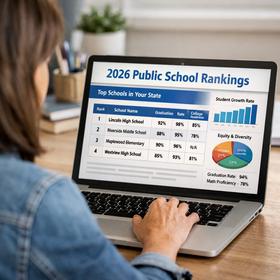For the 2026 school year, there are 6 public preschools serving 1,701 students in Roslindale, MA.
The top-ranked public preschools in Roslindale, MA are Mozart Elementary School, Philbrick Elementary School and Bates Elementary School. Overall testing rank is based on a school's combined math and reading proficiency test score ranking.
Roslindale, MA public preschools have an average math proficiency score of 29% (versus the Massachusetts public pre school average of 36%), and reading proficiency score of 32% (versus the 37% statewide average). Pre schools in Roslindale have an average ranking of 3/10, which is in the bottom 50% of Massachusetts public pre schools.
Minority enrollment is 72% of the student body (majority Hispanic), which is more than the Massachusetts public preschool average of 53% (majority Hispanic).
Best Public Preschools in Roslindale, MA (2026)
School
(Math and Reading Proficiency)
(Math and Reading Proficiency)
Location
Quick Facts
Rank: #11.
Mozart Elementary School
(Math: 45-49% | Reading: 40-44%)
Rank:
Rank:
6/
Top 50%10
236 Beech Street
Roslindale, MA 02131
(617) 635-8082
Roslindale, MA 02131
(617) 635-8082
Gr: PK-6 | 178 students Student-teacher ratio: 10:1 Minority enrollment: 53%
Rank: #22.
Philbrick Elementary School
(Math: 40-49% | Reading: 30-39%)
Rank:
Rank:
5/
Bottom 50%10
40 Philbrick Street
Roslindale, MA 02131
(617) 635-8069
Roslindale, MA 02131
(617) 635-8069
Gr: PK-6 | 132 students Student-teacher ratio: 9:1 Minority enrollment: 87%
Rank: #33.
Bates Elementary School
(Math: 35-39% | Reading: 30-34%)
Rank:
Rank:
4/
Bottom 50%10
426 Beech Street
Roslindale, MA 02131
(617) 635-8064
Roslindale, MA 02131
(617) 635-8064
Gr: PK-6 | 279 students Student-teacher ratio: 10:1 Minority enrollment: 56%
Rank: #44.
Sumner Elementary School
(Math: 29% | Reading: 35-39%)
Rank:
Rank:
4/
Bottom 50%10
15 Basile Street
Roslindale, MA 02131
(617) 635-8131
Roslindale, MA 02131
(617) 635-8131
Gr: PK-6 | 580 students Student-teacher ratio: 11:1 Minority enrollment: 75%
Rank: #55.
Conley Elementary School
(Math: 20-24% | Reading: 25-29%)
Rank:
Rank:
3/
Bottom 50%10
450 Poplar Street
Roslindale, MA 02131
(617) 635-8099
Roslindale, MA 02131
(617) 635-8099
Gr: PK-6 | 151 students Student-teacher ratio: 8:1 Minority enrollment: 81%
Rank: #66.
Haley Pilot School
(Math: 18% | Reading: 27%)
Rank:
Rank:
2/
Bottom 50%10
570 American Legion Hwy
Roslindale, MA 02131
(617) 635-8169
Roslindale, MA 02131
(617) 635-8169
Gr: PK-8 | 381 students Student-teacher ratio: 7:1 Minority enrollment: 77%
Roslindale, Massachusetts Public Schools (Closed)
School
Location
Quick Facts
Expulsion Alternative School (Closed 2006)
Alternative School
515 Hyde Park Avenue
Roslindale, MA 02131
(617) 635-8030
Roslindale, MA 02131
(617) 635-8030
Gr: 12
Frequently Asked Questions
What are the top-ranked public preschools in Roslindale, MA?
The top-ranked public preschools in Roslindale, MA include Mozart Elementary School, Philbrick Elementary School and Bates Elementary School.
How many public preschools are located in Roslindale?
6 public preschools are located in Roslindale.
What is the racial composition of students in Roslindale?
Roslindale public preschools minority enrollment is 72% of the student body (majority Hispanic), which is more than the Massachusetts public preschools average of 53% (majority Hispanic).
Which public preschools in Roslindale are often viewed compared to one another?
Popular comparisons of public preschools in Roslindale include: Conley Elementary School vs. Bates Elementary School, Bates Elementary School vs. Mozart Elementary School, Mozart Elementary School vs. Bates Elementary School
Recent Articles

Public School Rankings: Are They Accurate in 2026?
Are public school rankings accurate? Learn how rankings are calculated in 2026, what they miss, and how families can evaluate schools wisely.

How Are U.S. Public Schools Doing in 2026?
A 2026 update on how U.S. public schools are performing academically, financially, and socially in a post-pandemic era.

Helping Your Child Navigate Friendship Drama at School
Meta Description: Practical 2026 strategies for helping your child navigate friendship drama at school with confidence, empathy, and resilience.
